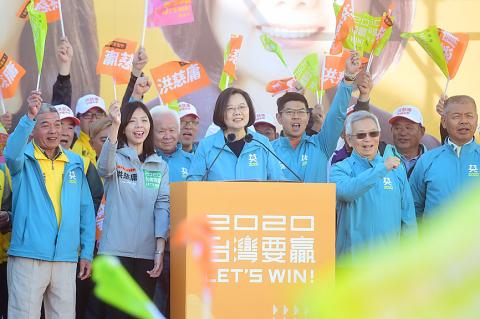President Tsai Ing-wen (蔡英文) yesterday urged voters to re-elect her, saying that the Jan. 11 elections are pivotal, because “the whole world is watching Taiwan” due to the protests in Hong Kong.
Tsai visited Penghu’s Magong City (馬公) in the morning, attended rallies in central Taiwan afterward, and stumped for Democratic Progressive Party (DPP) legislative candidates and those from smaller pan-green camp parties.
“The world wants to see what Taiwanese will decide. [The international community is] concerned that what has been taking place in Hong Kong might happen in Taiwan as well,” she told the crowds.

Photo: Liao Yao-tung, Taipei Times
Speaking about China’s “one country, two systems” formula, Tsai said: “This is not an option for Taiwanese.”
“Hong Kongers have taken to the streets because they have to fight for their freedom and democracy. In Taiwan, we have our freedom and democracy, that is because we have sovereignty, which is held by all 23 million of Taiwan’s population,” she said.
“Therefore we must safeguard our sovereignty, because if we no longer have it, Taiwanese will have to take to the streets to wrestle it away from China,” Tsai said.
She urged everyone to vote, saying: “The bigger the turnout, the louder our voice and our decision can be heard by the world... When our citizens cast their votes, we can safeguard Taiwan’s sovereignty, freedom and democracy, by which we can ensure to continue have these for our future generations.”
Meanwhile, Vice President Chen Chien-jen (陳建仁) focused on the nation’s multicultural society, saying that government policies in the past few years have allowed foreigners to settle down and enjoy Taiwan’s freedom and democracy.
Speaking at a gathering of new immigrant women in Taichung, Chen said the government’s New Southbound Policy is an important direction for the nation, as are its improved policies for “new residents” — foreigners who have acquired Republic of China citizenship.
DPP officials at the gathering said they met many new residents who have lived and worked in Taiwan for more than 20 years after marrying Taiwanese men, and that the best two words they had for the nation are “freedom” and “democracy.”
Many of them said they are happy to live here, because they can vote, participate in public affairs and fulfill their dreams, the officials said.
“Taiwan is a multicultural society and a vibrant place composed of many ethnic groups that welcomes people from other countries. Some have been here since historic times, and others arrived only recently, but everyone in Taiwan can pursue happiness and a better life. So we must cherish the freedom and democracy that we have,” Chen said.

SECURITY: As China is ‘reshaping’ Hong Kong’s population, Taiwan must raise the eligibility threshold for applications from Hong Kongers, Chiu Chui-cheng said When Hong Kong and Macau citizens apply for residency in Taiwan, it would be under a new category that includes a “national security observation period,” Mainland Affairs Council (MAC) Minister Chiu Chui-cheng (邱垂正) said yesterday. President William Lai (賴清德) on March 13 announced 17 strategies to counter China’s aggression toward Taiwan, including incorporating national security considerations into the review process for residency applications from Hong Kong and Macau citizens. The situation in Hong Kong is constantly changing, Chiu said to media yesterday on the sidelines of the Taipei Technology Run hosted by the Taipei Neihu Technology Park Development Association. With

CARROT AND STICK: While unrelenting in its military threats, China attracted nearly 40,000 Taiwanese to over 400 business events last year Nearly 40,000 Taiwanese last year joined industry events in China, such as conferences and trade fairs, supported by the Chinese government, a study showed yesterday, as Beijing ramps up a charm offensive toward Taipei alongside military pressure. China has long taken a carrot-and-stick approach to Taiwan, threatening it with the prospect of military action while reaching out to those it believes are amenable to Beijing’s point of view. Taiwanese security officials are wary of what they see as Beijing’s influence campaigns to sway public opinion after Taipei and Beijing gradually resumed travel links halted by the COVID-19 pandemic, but the scale of

A US Marine Corps regiment equipped with Naval Strike Missiles (NSM) is set to participate in the upcoming Balikatan 25 exercise in the Luzon Strait, marking the system’s first-ever deployment in the Philippines. US and Philippine officials have separately confirmed that the Navy Marine Expeditionary Ship Interdiction System (NMESIS) — the mobile launch platform for the Naval Strike Missile — would take part in the joint exercise. The missiles are being deployed to “a strategic first island chain chokepoint” in the waters between Taiwan proper and the Philippines, US-based Naval News reported. “The Luzon Strait and Bashi Channel represent a critical access

Pope Francis is be laid to rest on Saturday after lying in state for three days in St Peter’s Basilica, where the faithful are expected to flock to pay their respects to history’s first Latin American pontiff. The cardinals met yesterday in the Vatican’s synod hall to chart the next steps before a conclave begins to choose Francis’ successor, as condolences poured in from around the world. According to current norms, the conclave must begin between May 5 and 10. The cardinals set the funeral for Saturday at 10am in St Peter’s Square, to be celebrated by the dean of the College